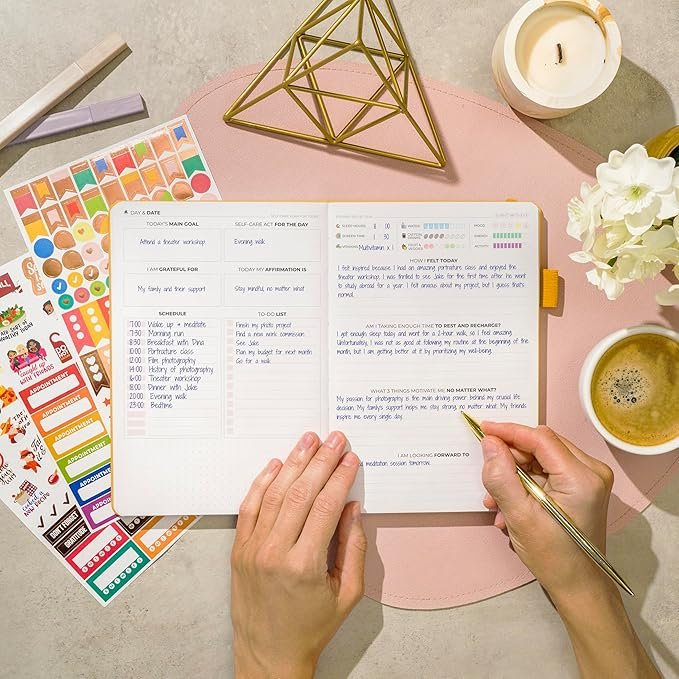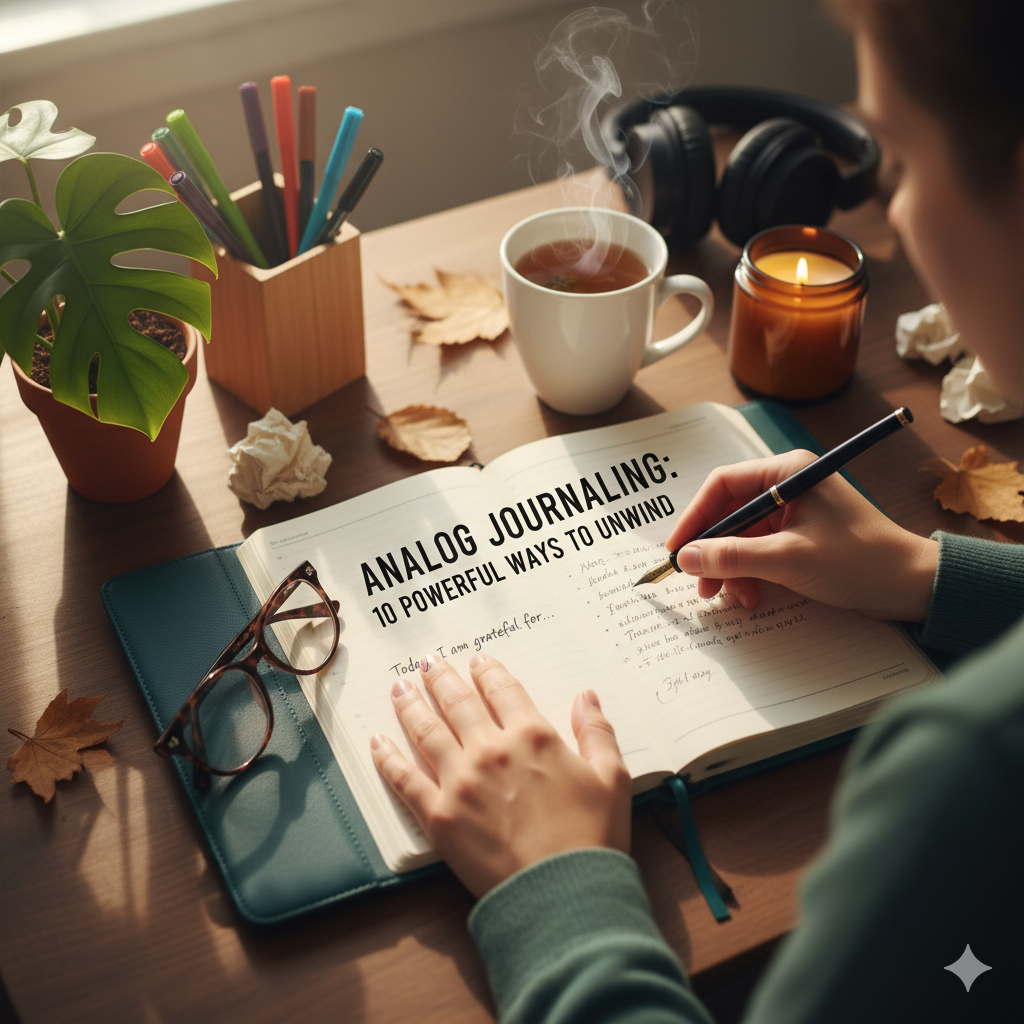In a world constantly buzzing with digital notifications and endless screens, finding true moments of calm can feel like a rare luxury. We’re always connected, always “on,” and our minds are often racing a mile a minute. But what if the key to unlocking profound stress relief and a deeper sense of well-being was as simple as picking up a pen and a notebook? Welcome to the wonderful world of analog journaling.
At unpluggedroutine.com, we believe in the power of disconnecting to reconnect – with ourselves, with nature, and with the simple, restorative practices that bring us peace. Analog journaling, the act of writing by hand, is one of the most effective and often overlooked tools in our unplugged toolkit. It’s a mindful practice that offers a sanctuary from digital overload, allowing you to process thoughts, emotions, and experiences in a tangible, deeply personal way.
The Digital Deluge: Why We’re More Stressed Than Ever
Let’s face it: our digital lives are overwhelming. From the moment we wake up, we’re bombarded with emails, social media feeds, news alerts, and endless to-do lists that live on our devices. While technology offers incredible convenience, it also fuels a constant state of low-level anxiety. We’re comparing ourselves to others, worrying about missing out, and struggling to switch off when our brains are hardwired for constant stimulation.
This chronic digital exposure impacts our sleep, our focus, and our overall mental health. Our brains are simply not designed to process this much information at this speed. The result? Increased stress, burnout, and a feeling of being perpetually overwhelmed. It’s time to hit pause and find a different path.
The Ancient Art of Analog Journaling: A Timeless Remedy
Journaling isn’t a new fad; it’s an ancient practice revered by thinkers, artists, and leaders throughout history. From Leonardo da Vinci’s notebooks to Marcus Aurelius’s Meditations, people have long understood the profound benefits of putting thoughts to paper. What makes “analog” journaling so special in our digital age? It’s the deliberate act of disconnecting.
When you engage in analog journaling, you step away from the glowing screens and the endless distractions. You embrace a simpler, more tactile experience. The scratch of the pen, the feel of the paper, the physical act of forming words – all these elements contribute to a more grounded and mindful state. It’s an invitation to slow down, breathe, and truly listen to what’s going on inside your head and heart.
Hook Step #1: The Pen-to-Paper Connection – More Than Just Words
Have you ever noticed how different it feels to write something down by hand compared to typing it? There’s a deep, almost primal connection when a pen meets paper. This isn’t just sentimentality; science backs it up.
Research shows that writing by hand engages different parts of your brain than typing. It stimulates neural pathways associated with creativity, memory, and cognitive processing. When you physically form letters, your brain has to work harder, leading to better retention and deeper engagement with your thoughts. This physical act becomes a form of mindfulness, anchoring you to the present moment and away from anxious thoughts.
5 Core Benefits of Analog Journaling for Stress Relief
Let’s dive into the tangible ways analog journaling can transform your stress levels and improve your mental well-being:
1. Emotional Release and Processing
Life throws a lot at us. We experience a spectrum of emotions – joy, anger, sadness, frustration, anxiety. Often, we bottle these up, especially the uncomfortable ones. Analog journaling provides a safe, non-judgmental space to vent, express, and release these feelings.
Think of your journal as your most trusted confidante. You can write down everything that’s bothering you without fear of judgment. This act of “getting it all out” can be incredibly cathartic, preventing emotions from festering and contributing to stress. It allows you to acknowledge your feelings, which is the first step towards processing and moving through them.
2. Clarity and Perspective
When your mind is racing, it’s hard to see things clearly. Problems can feel bigger and more overwhelming than they actually are. Analog journaling acts like a mental detox, helping you untangle your thoughts and gain new perspectives.
By writing down your worries, you often see patterns, identify triggers, and sometimes even realize that a problem isn’t as insurmountable as it seemed in your head. It helps you organize chaotic thoughts into coherent ideas, bringing order to mental clutter. This clarity is a powerful antidote to stress, as it empowers you to approach challenges with a calmer, more strategic mindset.
3. Problem Solving and Decision Making
Once you’ve achieved clarity, analog journaling becomes an excellent tool for problem-solving. When you write down a problem, you can break it down into smaller, more manageable parts. You can brainstorm solutions, weigh pros and cons, and explore different angles without the pressure of an immediate decision.
This reflective process allows you to approach challenges thoughtfully, rather than reactively. It helps you to identify potential roadblocks and devise strategies to overcome them, fostering a sense of control and reducing anxiety about the unknown.
4. Cultivating Gratitude and Positivity
Stress often magnifies the negative aspects of life. Analog journaling can intentionally shift your focus towards gratitude and positivity, even amidst challenges. Dedicate a section of your journal to listing things you’re grateful for each day.
This simple practice retrains your brain to notice the good things, no matter how small. It helps you appreciate the present moment and recognize the abundance in your life, even when things are tough. A regular gratitude practice is scientifically linked to increased happiness, improved mood, and greater resilience to stress.
5. Self-Awareness and Personal Growth
Perhaps one of the most profound benefits of analog journaling is the increased self-awareness it fosters. By consistently writing about your experiences, reactions, and aspirations, you start to understand yourself better. You learn what makes you tick, what triggers your stress, what brings you joy, and what your true values are.
This deep dive into your inner world empowers you to make choices that align with your authentic self, leading to a more fulfilling and less stressful life. It’s a journey of self-discovery that continually evolves, helping you grow and adapt with greater confidence.

Hook Step #2: Choosing Your Analog Sanctuary – Notebooks and Pens
Part of the joy of analog journaling is the tactile experience. It’s about more than just the words; it’s about the tools you use. Consider investing in a notebook and pen that genuinely appeal to you.
Do you prefer a sleek, minimalist journal or one with a vibrant, artistic cover? Lined pages, dotted grids, or blank canvases? A smooth gel pen, a classic ballpoint, or a luxurious fountain pen? The choice is yours. Making your journaling tools aesthetically pleasing and comfortable to use adds another layer of enjoyment and encourages consistency. This small act of personalization can make the practice feel more inviting and special.
How to Start Your Analog Journaling Journey Today
Ready to experience the stress-relieving power of writing by hand? Here’s a simple guide to get you started:
1. Find Your Sacred Space and Time
Choose a quiet spot where you won’t be disturbed. This could be a cozy corner of your living room, your bedside table, or even a bench in a peaceful park.
Dedicate a specific time each day, even if it’s just 5-10 minutes. Mornings can be great for setting intentions, while evenings are perfect for reflection. Consistency is more important than duration.
2. Ditch the Pressure, Embrace the Flow
Remember, there are no rules in journaling. You don’t need perfect grammar, eloquent prose, or even complete sentences. This is your private space.
Don’t censor yourself. Write whatever comes to mind, no matter how silly, mundane, or intense it may seem. The goal is authentic expression, not literary masterpiece.
3. Try Journaling Prompts for Inspiration
If you’re not sure what to write, journaling prompts can be a fantastic starting point. Here are a few ideas:
- “What’s on my mind right now?”
- “What am I feeling today, and why?”
- “What’s one thing I’m grateful for?”
- “What challenge am I facing, and what are some possible solutions?”
- “If I could tell my past self one thing, what would it be?”
- “What brings me joy?”
- “How do I want to feel at the end of the day?”
4. Experiment with Different Styles
Analog journaling isn’t just about writing paragraphs. Feel free to experiment:
- Bullet Journaling: Use bullet points to track tasks, habits, and thoughts.
- List Making: Create lists of your worries, joys, ideas, or things to remember.
- Freewriting: Write continuously without stopping for a set amount of time, letting thoughts flow freely.
- Mind Mapping: Visually connect ideas and thoughts using branches and diagrams.
- Sketching/Doodling: Don’t underestimate the power of visual expression to process emotions.
5. Revisit Your Entries (Periodically)
Occasionally, take time to re-read past entries. This can offer incredible insights into your personal growth, how you’ve overcome challenges, and patterns in your thinking. It’s a powerful reminder of how far you’ve come.
Analog Journaling: Your Personal Sanctuary in a Noisy World
In a world that constantly demands our attention, analog journaling offers a radical act of self-care. It’s a personal sanctuary where you can truly be yourself, process your experiences, and cultivate a deeper sense of peace and understanding. It’s a powerful reminder that sometimes, the most profound forms of stress relief come from simply unplugging and reconnecting with the timeless wisdom of writing by hand.
Ready to claim your calm?

Conclusion: Embrace the Pen, Unplug, and Find Your Calm
The journey to stress relief doesn’t always require complex solutions or expensive gadgets. Sometimes, the most effective path lies in rediscovering simple, time-honored practices. Analog journaling is more than just writing; it’s a mindful act of self-care, a digital detox for your mind, and a powerful tool for emotional well-being. By engaging your senses, processing your thoughts, and cultivating gratitude, you can significantly reduce stress and enhance your overall quality of life.
Ready to start your unplugged routine? Grab a notebook, pick up a pen, and begin your journey to a calmer, more reflective you. Visit unpluggedroutine.com for more tips on disconnecting to reconnect and discovering practices that nourish your soul. Share your journaling journey with us in the comments below – we’d love to hear how writing by hand has helped you unwind!